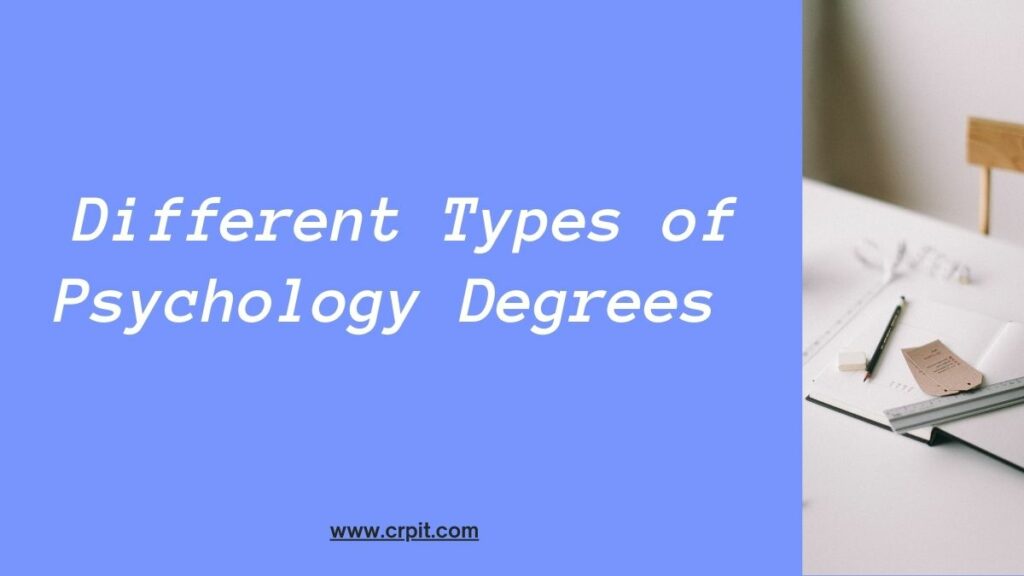Psychology Degrees – For students, an essential part of any college is selecting a subject. A Psychology degree may be quite tempting for people who are willing to understand themselves and mankind in general.
A psychology Degree can be used in a variety of ways; several graduates continue further to complete a degree, whereas some others start working within the mental health industry straight away if they desire.
For some students, a fruitful career in advertising, retail, HR, or welfare services can be achieved by utilizing their psychology degree. Regardless of your motivations for pursuing a degree in psychology, it really is necessary to pick a school that can help you reach your career objectives.

Table of Contents
Psychology Degrees
The degree is the analysis of psychological relationships among the surroundings, behaviour, and intellect. The fundamental objectives of a psychologist are to comprehend, regulate, and predict psychological and mental activities.
A profession in psychology may be found in a wide range of industries, containing companies. Childhood development, clinical psychology, and forensic psychology are just a few of the numerous fields available to those who desire a career in mental science.
In addition to a profession, you may select from a level of degrees of the association. You might study for a bachelor’s degree, an associate degree, a master’s degree, a Psy.D., or a Ph.D.
Who is Eligible for Psychology Degrees?
If you are thinking to apply for a Psychology program, then must go through with the eligibility criteria for UG and PG mentioned below.
For UG Psychology Degrees
- Students must pursue or complete the 12th Class exam or have received a similar degree from the central or state board of education.
- Candidates must have at least an overall score of 50% in the 12th class.
- Aspirants from any discipline, including the arts, sciences, and business, may submit applications for psychology programs.
- The qualifying requirements for psychology studies may vary between colleges and universities.
For PG Psychology Degrees
- Students can enrol in this program if they possess a bachelor’s degree with psychology as their primary reference.
- Psychology ought to be the first topic for the last semester’s papers/subjects in order to calculate overall grades.
- Applications of students who will be taking the final year examination for a bachelor’s degree are therefore accepted.
Recommended Read: Best Community Colleges 2024: Top Public Colleges and Universities in the United States
What Are the Different Types of Psychology Degrees?
Following are the many kinds of psychology degrees with a brief introduction to each.
Associate Degree
An associate degree in psychology is an undergrad degree that typically requires 2 years to achieve. Community colleges frequently provide undergraduate degree options, and several students enroll in public universities to finish their bachelor’s degrees.
To put it simply, there are fewer associate-level slots open. An associate degree is a minimum needed for the majority of psychology careers. Prior to pursuing more challenging courses, an undergraduate degree is indeed an excellent method to build a strong foundation in psychology.
It is frequently viewed as a necessary step for completing a bachelor’s. Working as a psychology assistant at a state mental institution is a potential career path for those having a psychology graduate degree.
Bachelor’s Degree
A bachelor’s degree in behavioural psychology or imposed psychology is provided by all colleges. The majority of programs reach for the fulfilment of 120 credits, including classroom instruction and major-related electives.
Distinct programs may also contact for jobs and academic research. For graduation, students usually require 4 to 5 years. While master’s or doctoral degrees are necessary for work as professional psychologists or counsellors.
Bachelor’s plans also give pupils a vital understanding of how individuals behave and react in addition to helpful abilities in the study, critical analysis, and language. There seem to be two primary sorts of bachelor’s degrees in psychology, each of which has a somewhat form of learning:
Bachelor of Science in Psychology (BS)
For example, starting studies in clinical psychology, experimentation, and data analysis are typically included in BS of Psychology degrees. Additionally, these programs often put more of a focus on mathematics and theoretical physics while requiring fewer courses in general education.
A Bachelor of Science in Psychology may be a preferable option for candidates who are interested in pursuing further courses and professions in psychological, medical, and volunteer work due to the focus on applied psychology as well as methodological approaches.
Bachelor of Arts in Psychology (BA)
A blend of liberal arts classes of general education alongside psychology modules that present the fundamentals of a field makes up the standard syllabus for BA in Psychology. Students who will register for a BA degree have a wide range of academic fields including social, and behavioural characteristics as well as literature, history, and linguistics.
As a result of the coursework’s focus on developing powerful interpersonal abilities, students are prepared to pursue graduate studies or careers in a range of fields, including commerce, administration, and social service.
Master’s Degree
A Master’s program in psychology is just a graduate assistantship that requires 2 to 3 years of study other than a bachelor’s degree. Students often have the option of a Master of Science (M.S.) or Master of Arts (M.A.) in master’s degree in psychology, similar to the bachelor’s program.
Among the most prominent academic alternatives is a master’s since many additional opportunities are there at the post-graduate level as compared to the graduate level. Many master’s programs have a stronger significance in educating people for doctoral study, whereas other master’s degree provides what’s regarded as a state of fulfilment, or a terminal degree intended to equip candidates for employment.
Students who possess a master’s degree typically work in a diverse range, such as businesses, governmental bodies even mental health organizations. A handful of possibilities to educate on campuses and universities, but such jobs are few and quite challenging. Students who have master’s degrees could work as licensed therapists, rehab counsellors, child psychologists, or HR managers, among other professions.
Next read for you 10 Glorifying and High-Paying Careers in Healthcare Administration
Ph.D. Degree in Psychology
A Psy.D. or a Ph.D. are the two options for such a psychology doctoral after receiving a master’s degree. Individuals who want to pursue careers as clinical psychology counselors often receive one of these degrees. Learners are highly qualified for professions in research and academics after earning a Ph.D.
The duration of a psychology PhD program is 4 to 7 years. Several schools need a minimum GPA of 3.0. Most of them allow both candidates to have psychology degrees and individuals who have postgraduate degrees in relevant subjects. You must’ve been capable of showing that the master’s degree teaches you just as effectively as a psychology master’s degree would.
After receiving a psychology Ph.D. degree, several countries will also demand that you complete an entire year of post-doctoral study under the guidance of a professional psychologist in order to obtain your license. State-specific criteria may differ from one another.
Psy.D. Degree in Psychology
Anyone can become a licensed psychologist by earning a Ph.D. or a Psy.D. in psychology. For this license, a PhD is necessary throughout all states. Courses within clinical psychology concentrate on recognizing and managing mental illnesses.
Training in counselling psychology includes a substantial concentration on social justice bars in addition to methods for therapists to assist people in managing mental health concerns in the aspect of local surroundings.
Students of Psy.D. programs seem to be more inclined to be employed among clients in hospitals than in education or research. Studies in strategy and analysis are suggested including both majors. The Psy.D., on the other hand, is more concerned with practical application.
Either with qualification, you can get licensed as a psychologist. A Psy.D. course requires 4 to 7 years to finish, similar to a PhD. Many candidates get a minimum GPA of 3.0. Both statistical and qualitative study skills are required, as well as a strong background in statistics.
Choosing the Appropriate Psychology Degree
Identifying your professional motto is the initial step in choosing the psychology degree that will meet your requirements. A master’s or doctoral certificate in psychology is required in case you desire to work as a therapist, counsellor, or clinical licensed psychologist. By this objective, you might decide to pursue a bachelor’s program in psychology though you could think about obtaining a certificate in a similar field, like sociologists or consultants.
FAQ’s
What is the lowest degree in psychology?
A bachelor’s degree program is the basic need for the majority of admittance-stage psychology careers.
Is psychology a tough major?
Psychology is among the most challenging courses, and a lot of student projects will ask them to reference specific publications and provide evidence to support their ideas.
How many years does it take to be a psychologist?
Throughout many cases, being a registered psychologist could require a minimum of 8 years or a maximum of 12 years. Students must be familiar with each of the learning and training prerequisites required to become licensed psychologists since they’re considering a profession in psychology.
